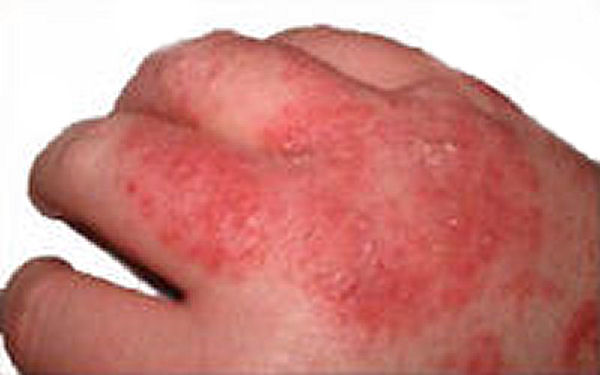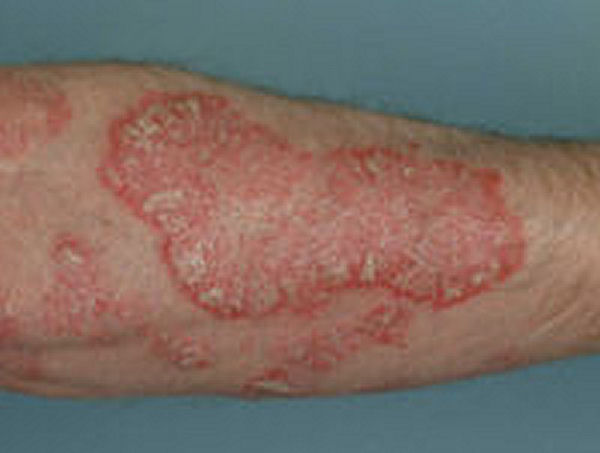
Signs and Symptoms of Eczema
Eczema (also known as dermatitis) is a non-contagious type of skin inflammation that is characterized by one or more of the following symptoms:
- Red patches
- Itchiness
- Scaling
- Swelling or blistering
- Cracking or dryness
- Oozing or bleeding
Note that some of these symptoms are also characterized by psoriasis, so it is important to understand the differences. Psoriasis often affects the front of the knees and back of the elbows, while eczema typically affects the back of the knees and inside of the arms.
Causes of Eczema
The exact cause of eczema is somewhat unclear. However, it is believed to be our immune system's response to an irritant. Some of these triggering irritants include:
- Temperature changes, particularly exposure to extreme cold or excessive heat.
- Soaps, laundry detergents, and cleaning products.
- Fabric-softening dryer sheets.
- Certain perfumes and cosmetics (particularly cosmetics containing formaldehyde).
- Exposure to dust, pollen, pet hair/dander, moulds, or fungi.
- Stress or anxiety.
- Excessive sweating.
- Colds, flus, or other infections.
- Exposure to coarse materials such as wool.
- Anti-perspirants (since they contain active drying ingredients such as aluminum chloride).
Home Remedies and Natural Treatments for Eczema
Chamomile
Studies have found that chamomile contains anti-inflammatory properties that can help relieve eczema discomfort. Therefore, an effective natural eczema treatment can be made by using chamomile tea bags as a compress. Simply dip a chamomile tea bag in hot water for 5 minutes, and then let it cool until it is at a comfortable temperature for placing on the skin. Then place the tea bag on areas affected by eczema for 20 minutes. Repeat this up to 3 times throughout the day.
Calamine Lotion
For oozing eczema as well as other skin rashes, calamine lotion is great for relieving itchiness. Simply apply a small amount directly onto the affected area. Calamine lotion can be found in most drugstores.
Ice Packs
An ice pack is a great way to relieve the itching associated with eczema. Simply place a few ice cubes into a plastic bag, and then wrap the bag with a towel. Then apply the towel onto the itchy areas for some quick relief.
Milk Compress
If you have eczema which oozes, a cold compress with milk is an easy way to relieve the itching. Here's how:
- Pour cold milk onto a thin piece of cotton or gauze pad.
- Apply it to the itchy skin for approximately 3 minutes.
- Resoak the cloth with milk and apply for another 3 minutes. Do this twice.
- Rinse your hand with cool water when finished.
- Repeat this several times throughout the day.
Humidify Your Room
Almost any form of winter skin itch or dry skin can be relieved by adding moisture to the air around you. Therefore, a cool-air humidifier is a great way to help prevent eczema/dermatitis. An economical alternative to a humidifier is to place shallow pans of water near a radiator.
Beat Eczema
A comprehensive eBook called Beat Eczema claims that you can be eczema free in 2 weeks without any medications. There is a 60-day 100% money back guarantee, so it might be worth checking out. Click here to find out more about their approach. If you happen to try it out, please post your results below to help others decide if it is a worthwhile product.

I had a lot of bouts of eczema due to stress as a child and even later in life. But I was able to stop breakouts by using lotions containing Urea which my doctor suggested. The best one so far has been Eucerin for extremely dry skin and urea is listed in the ingredients. There are other soothing ingredients in there as well. It cleared up every breakout from my hands, feet, etc. I hope this helps!
I have Dyshidrotic Eczema, which is eczema on my hands, it gets so bad that my hands crack and bleed, it is too painful to do even the simplest task. I tried a dermatologist and he wanted to treat me for Psoriasis, the drugs had worse side effects than the cure. I now put just Vaseline on my hands at bedtime and put on nitrile gloves, my hands stay great just doing this.
My baby have eczema, and anything I try doesn't help her.
I am having a lot of itching and rashes and nothing seems to help. Any suggestions please?
If you have Eczema, only organic products should be used and should be from renown brands. Also before using any product, discuss with your the doctor and know which type of eczema you have.
Speaking from experience of chronic childhood Atopic eczema in the classic mouth-wrists-elbows-backs of knees-ankles formation (and a few acute adulthood outbreaks), Calamine lotion is an absolute NO-NO. The aim should always be to keep the skin as moisturised as possible and Calamine dries the skin out. So after my parents applied the lotion - as advised by the doctor - I would literally rip into my skin until it bled. Itch relief creams are preferable, at least, because they moisturise at the same time but these weren't available in my childhood.
Milk compress also sounds like a TERRIBLE idea to me, especially as many people with eczema have milk allergy/sensitivity.
It seems to me that doctors are either undereducated or simply do not care about Eczema, maybe because it is not a life-threatening illness or perhaps because they cannot comprehend its effects on the sufferer's day-to-day existence. So the vast majority will always prescribe steroid creams on the first visit. Aside from the other undesirable side-effects, there is often a rebound effect, so just when you think you're on top of the symptoms, you stop applying the steroid cream and the eczema comes back worse than before.
I am no expert, but I am certain that there is always a cause (alongside genetic predisposition) for an outbreak of eczema. When I was a child I would frequently visit my grandparents who owned 2 Springer Spaniels. I was very evidently allergic to the fur and saliva of these lovely dogs so just being in the same space would cause me to scratch and wheeze, and simply carrying their hairs home on my clothes and transferring to other clothes and furniture meant that I couldn't escape a horrible long-term escalation in symptoms. Sadly, there is no furry or fleecey animal that I am not allergic to, and I urge everyone to investigate animal allergy as a potential cause.
Aged 11, I was admitted to hospital so I could have an intensive coal tar wrap treatment. Within that week the eczema had cleared, but I do not know for sure that it cleared because of the coal tar or because I had been removed from an allergic environment, but the eczema returned shortly after I left hospital. After we had moved far away from my home town in my early teens I found that my eczema cleared up and only returned after visits, except for a few outbreaks in my late teens and adulthood. At this time I unwittingly slept in a bed that had been occupied by a cat and had a strange outbreak of discoid eczema (I initially mistook it for ringworm) around my hip area that cleared in a matter of weeks without medication. Later, after a particularly bad year-long outbreak of actual head to toe blistering in my early 20s (I think dishydrosis or something very similar to dermatitis herpetiformis) I finally stopped eating or drinking anything containing dairy and eggs and it cleared almost immediately. After around 6 months I began to gradually reintroduce dairy into my diet and suffered another outbreak of the blistering variety around 5 years afterwards. This time I reduced the dairy, and took anti-biotics twice for an infection that had developed but did not clear until I took regular baths in an anti-microbial emulsifier (Dermol600) that an out-of-hours doctor prescribed for me. Now I am (touch wood) eczema free aside from a tiny, silvery, non itchy patch on the side of my knee joint and occasionally a few tiny blisters around my fingertips.
The things that work for me:
1. I take a Piriton once before bed and I am convinced this keeps any allergies at bay and I carry the tablets everywhere with me.
2. I always moisturise immediately after patting dry whenever my skin comes into contact with water.
3. I never moisturise eczema without washing/ soaking in very warm water (for some reason cold or luke-warm immersion causes me to itch after I apply moisturiser. In my experience moisture and unsoaked dry, cracking eczema is like oil and water - they resist each other.
4. I only use unscented, very basic, greasy moisturisers (E45, Vaseline, Eucerin) on eczema, but on completely clear skin I seem to be OK with luxuriant scented stuff. Yey!
5. Try to avoid anything that foams coming into contact with eczema, although immediate moisturisation after bath or shower should counteract the drying effect of Sodium Lauryl/ Laureth Sulphate. Unfortunately it is impossible to moisturise the scalp so I just use the simplest shampoos I can find if my scalp itches and flakes. Sometimes I'll use T-gel because of the coal tar component.
6. Get allergy tests where possible and do food diary. Don't rule any substance out as a potential allergent/ irritant (I found that symptoms improved after I stopped using Aqueous cream for cleansing which was surprising since it was prescribed).
7. Do not assume that your Doctor/ skin specialist knows how to treat your eczema especially if they palm
you off with steroid ointment.
8. Take high dose Evening Primrose (Epogam?) and/ or Cod Liver Oil (but mind you do not overdo the added Vitamin E because too much bad for the health) because essential fatty acids help in the long term.
Hi there, I have extreme eczema. I've been to the doctor so many times and all I got was more expensive creams as well as an injection which didn't help. I then cut out dairy and wheat and that helped. I also got stuff to put in my bath water to rehydrate my skin, and I bought cetaphil restoradream. I also realised my eczema came from stress so I am now also on tablets that are like rescue tablets. All of this seems to be calming my eczema.
I had the same on my hands. I stopped drinking soda and it slowly went away for good. No more soda for this guy because I don't want crocodile hands. It was frustrating.
Appyling Sudocreme onto the affected skin, helps relieve my eczema. Also drinking turmeric powder in warm water (2 tsp) every day helps. Drink lots of water as turmeric can cause dehydration.
since I live in the Caribbean I have eczema under my feeds.
Expensive doctor lotion and cremes do not help enough.
i started to bath my feeds 2,3 time the week in baking soda or sulfur powder. It help. Also I use snake oil ... it helps....sulfur cremes helps.....but the most important to do is to stop scratching and pulling, and then the skin can start to heal!